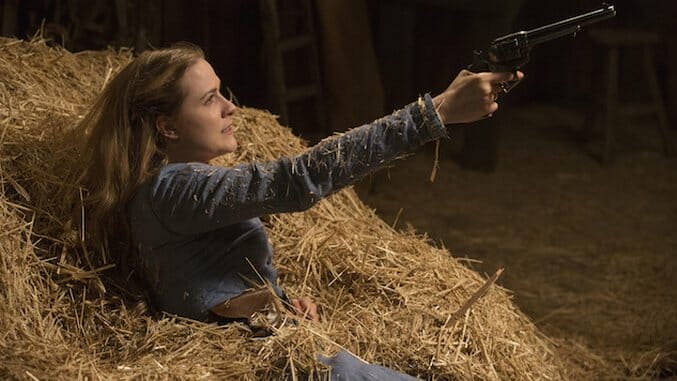How Westworld Dissects Rape Culture
John P. Johnson/HBO
HBO’s Westworld takes the idea of robotic interaction and pushes it to the nth degree, giving us a world where the line between real people and robots is smudged beyond repair. Robotic women immediately conjure up comparisons to the Stepford Wives, or to Ava in Alex Garland’s film, Ex Machina, but to watch Westworld is to ponder the very nature of womanhood today. In addition to considering female identity and its connection to sexuality, Westworld dissects and investigates consent, whether rape culture can be erased and who should wield the eraser.
As the train pulls into the dusty theme park known as Westworld, the audience, and the guests paying $40,000 a day to play in it, are aware of the robotic “Hosts” inhabiting the town. Part of the show’s fun is deducing who’s real and who’s a Host. Dolores (Evan Rachel Wood), Maeve (Thandie Newton) and Clementine (Angela Sarafyan) are the feminine trio Westworld has cast its gaze on so far. They are lessons in the female personality as envisioned by men, representative of fantasy itself: Dolores, the sweet farmer’s daughter; Maeve, the town madam whose personality isn’t quite right for the experience of the paying guests; and Clementine, the wide-eyed prostitute always in danger.
Driven by its creator, Dr. Robert Ford (Anthony Hopkins), the Westworld theme park is presented through a predominantly male viewpoint, one at odds with its female heroines. These archetypes aren’t new to the Western, with facsimiles in cowboy-themed entertainment for decades. The distinction lies in the Westworld experience, which allows the men to indulge their inner id on the female characters because of the women’s robotic makeup. As Dolores and Maeve learn more about themselves and question their own existence, they’re forced to confront their own tortured pasts and their role within the Western genre—one filled with rape, violence and murder.
As Ford says, each character’s story has a small grain of truth buried within it, so it’s not difficult to fathom that Ford utilizes his own outdated notions of women and their role within popular Western culture for the park. His ability to play God allows him a chance to recreate Eve without Adam’s rib, while still condemning her: Though each women is created free from sin, men write it on them. Ironically, Dolores and Maeve taste from the Tree of Knowledge by changing their loops—the history, repetitiously played out, that Ford has written for them.
Westworld’s Alice in Wonderland, Dolores’ good girl nature makes her perfect prey for black hats, and this violation of goodness is meant to titillate. For Dolores to retain her traumatic memories—of the rape in her loop and her parents’ murder—taints her as damaged goods. To crack her exterior is to ruin what makes her valuable: her virginity, goodness and wholesomeness. This backstory prevents her from engaging and acting on her own desires. Her unfulfilled romance with Teddy (James Marsden) never focuses on the physical act of sex—it’s assumed intercourse between Hosts doesn’t happen—but on the amorphous concepts of “freedom” and “being together.” Dolores is apple pie, a source of stability and true love. Possibility, but never purpose.
Unaware of their robotic nature, Dolores and Maeve are, much like humans, unable to ignore the lingering doubts they have about their way of life. With that comes re-defining their purpose as women within the grander society. Westworld is a land to indulge fantasies, but said fantasies aren’t created with an eye towards the female experience. The female characters’ sexuality is written into their origins, where physical and sexual violence dominates. Dolores’ “loop” punishes her with the death of her parents for failing to return home by curfew and sees her raped in the barn: The implantation of these events in her loop reflects the park’s use of Dolores as an object of rape. The second time the assault occurs, though, an inner voice tells Dolores to kill her attacker, giving her the ability to stop the repetition of rape in her life. Once Dolores pulls the trigger, it alerts the audience to the first serious break in her narrative.